ARTS AND HUMANITIES
Africana studies at 40: Pioneering and leading
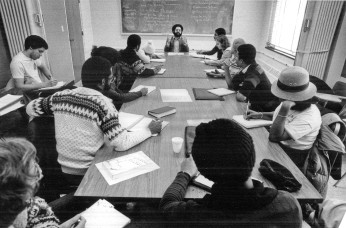
Robert L.Harris Jr. teaching in the early 1970s. See larger image
Cornell's Africana Studies and Research Center, established during a time of political struggle and minority exclusion on campuses nationwide, is entering its 40th year with its sights set squarely on the future.
Conceived as an independent, transdisciplinary unit, ASRC encompasses the study of African, African-American and African diaspora peoples, history, culture and ideas. The center produces publications, sponsors outreach and hosts conferences and prominent authors and scholars.
The center has forged academic ties across campus from its inception, when its course credits were accepted in four Cornell colleges. "[We have] very productive scholars doing interdisciplinary work," says Salah Hassan, ASRC director since 2005. "We've always included scholars who work in more than one area."
The center has 11 dedicated faculty members, plus four lecturers and visiting scholar Ushari Khalil from Sudan. It is approaching a gender balance in hiring, with four "highly engaged" women faculty members, Hassan says, "and also an intellectual balance, with appointments in the social sciences, in cultural studies, and the arts and humanities."
ASRC will offer 40 undergraduate and graduate-level courses in fall 2009 and 47 in spring 2010 (some cross-listed with other departments), including writing seminars, thesis and independent study.
After an external review based on a critical self-study in 2008, ASRC established an advisory council of prominent scholars from outside Cornell to guide implementation of the review's recommendations.
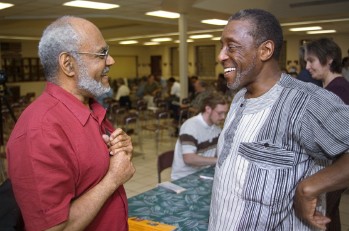
Civil rights veteran activist Robert Moses, left, chats with Cornells James Turner, emeritus professor and former director of the Africana Studies and Research Center during Moses 2005 visit to Cornell and Ithaca. See larger image
Hassan highlights the recent strides Africana has made, and initiatives in its five-year plan for growth and development. They include:
- recruitment of senior faculty, with five new hires since 2008: associate professor of African-American literature Riché Richardson, an artist and a cultural envoy to Paris in early 2009; Grant Farred, a cultural studies theorist and editor of South Atlantic Quarterly; Judith Byfield, a historian and vice president of the African Studies Association; Carole Boyce Davies, a gender theorist who helped build the African Diaspora Program at Florida International University; and Travis Lars Gosa, a sociologist joining the faculty this fall, specializing in hip-hop, African-American youth culture and education.
- building an accredited Ph.D. program in African and African-American studies. The Graduate School will consider the proposal this fall.
- expanding the undergraduate curriculum. "We've added 17 courses, with a balance of social sciences and humanities," Hassan says.
- an African languages curriculum. In addition to Kiswahili (taught for 35 years) and Arabic (in collaboration with Near Eastern Studies), the center has added Yoruba and Zulu, and offers one-to-one instruction in other languages when needed.
- linkages to African universities. Edited volumes are being published from two joint conferences with Addis Ababa University, one at Cornell on modernity and monarchy in Ethiopia, and one in Addis Ababa on Darfur and crisis of governance in Sudan. The center is also pursuing a study abroad program through professor emerita Anne Adams, who directs the W.E.B. DuBois Center in Ghana.
- forming an advisory council that will include Africana alumni.
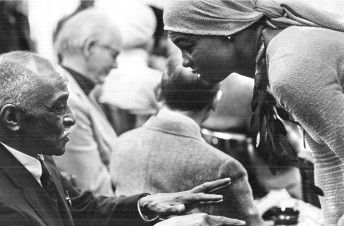
Professor Jay Saunders Redding with visiting professor Eleanor Traylor at the Africana Center. See larger image
"We've expanded the notion of what academia can look like," Hassan says. "We remain socially and intellectually engaged, and we want to remain connected to issues of concern to African-Americans and the global African community."
Africana's foundations
The Africana Center and its achievements would not have been accessible in mid-1960s academia, says James Turner, founding director of ASRC from 1968-86. At that time, a Eurocentric construction of knowledge was dominant, and black students nationwide campaigned for educational reform.
"Africa was regarded as a continent of modest civilization and unimportant in international geo-politics," Turner says. "African-Americans were not recognized for their vital role in the making and building of America, especially economically and culturally."
The pilot for what became Africana studies at Cornell came in 1968-69, with courses in African-American literature and politics of the civil rights movement, taught by Society for the Humanities visiting fellows Michael Thelwell, Cleve Sellers and Haki Madhubuti.
The proposed center was actively supported by Keith Kennedy (then associate dean in the College of Agriculture), President James Perkins and his successor, Dale Corson, whose "vision and determination to support African-American studies was very important," Turner recalls.
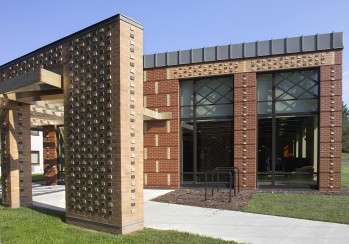
The Africana Studies and Research Center on North Triphammer Road. See larger image
The center opened in September 1969 with 160 students, 10 courses and seven faculty members. The original facility at 320 Wait Ave. was destroyed by arson in April 1970, and in 1971 ASRC moved to 310 Triphammer Road. That building was renovated and rededicated in 2005 with an expanded library and a multipurpose room accommodating 150 people.
"We've expanded the notion of what academia can look like," Hassan says. "We remain socially and intellectually engaged, and we want to remain connected to issues of concern to African-Americans and the global African community."
Africana's foundations
The Africana Center and its achievements would not have been accessible in mid-1960s academia, says James Turner, founding director of ASRC from 1968-86. At that time, a Eurocentric construction of knowledge was dominant, and black students nationwide campaigned for educational reform.
"Africa was regarded as a continent of modest civilization and unimportant in international geo-politics," Turner says. "African-Americans were not recognized for their vital role in the making and building of America, especially economically and culturally."
The pilot for what became Africana studies at Cornell came in 1968-69, with courses in African-American literature and politics of the civil rights movement, taught by Society for the Humanities visiting fellows Michael Thelwell, Cleve Sellers and Haki Madhubuti.
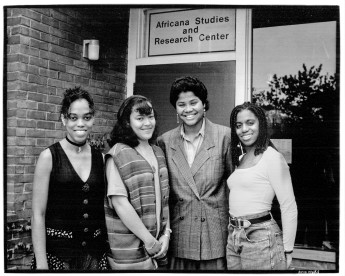
Students Elizabeth Thomas, Christine Bernard, Tara Leaman and Lasonia Gidney in 1994. See larger image
The proposed center was actively supported by Keith Kennedy (then associate dean in the College of Agriculture), President James Perkins and his successor, Dale Corson, whose "vision and determination to support African-American studies was very important," Turner recalls.
The center opened in September 1969 with 160 students, 10 courses and seven faculty members. The original facility at 320 Wait Ave. was destroyed by arson in April 1970, and in 1971 ASRC moved to 310 Triphammer Road. That building was renovated and rededicated in 2005 with an expanded library and a multipurpose room accommodating 150 people.
Establishing a research library -- as a resource for visiting scholars and for students and faculty on campus -- was crucial to the center's mission.
Cornell was not just swept along in the black studies movement; it emerged as a leader in the newly established field of Africana studies.
With a unified rather than a discipline- or area-bound approach, "the Africana center provided a model that units at other universities sought to emulate," Hassan says, noting such peer institutions as Harvard, Princeton, Northwestern and Yale. "It brought Africana and African-American studies together in one place" instead of being split among various departments.
In 1973 ASRC granted the first master's degree in a pioneering and still pre-eminent graduate program in African and African-American studies. By 1976 the number of students and course offerings would more than double from 1969 levels.
The center's stature and reputation grew when it attracted many distinguished scholars and intellectuals to Cornell. Its success also opened intellectual space for women's studies, Latino studies and Asian-American studies at Cornell, Turner points out. Students enrolled in courses at the Africana center also reflect all demographic sectors of Cornell.
"From the beginning it was our commitment to develop a first-class academic program with an integrated curriculum," Turner says. "Africana studies has enhanced pedagogy and the intellectual environment at Cornell by the construction of a rigorous scholarly discipline that has broadened the parameters of education."